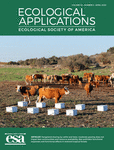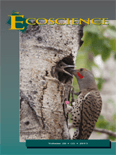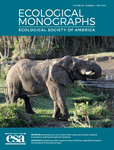
ECOLOGICAL RESEARCH
Scope & Guideline
Pioneering insights that drive ecological practices and policies.
Introduction
Aims and Scopes
- Biodiversity and Ecosystem Dynamics:
Research exploring the diversity of species within ecosystems, their interactions, and how these relationships influence ecosystem functions and services. - Environmental Change and Impact Studies:
Studies assessing the effects of climate change, pollution, and land-use changes on ecological systems, including both terrestrial and aquatic environments. - Plant and Soil Ecology:
Investigations into plant-soil interactions, nutrient cycling, and the role of plants in ecosystem health and stability. - Conservation and Restoration Ecology:
Research focused on strategies for conserving biodiversity, restoring degraded ecosystems, and understanding the ecological impacts of invasive species. - Methodological Innovations in Ecology:
The development and application of new methodologies and technologies in ecological research, such as remote sensing, genetic analyses, and citizen science.
Trending and Emerging
- Integrative Approaches to Biodiversity:
There is a growing trend towards studies that integrate genetic, ecological, and environmental data to provide a comprehensive understanding of biodiversity and its implications for conservation. - Impact of Climate Change on Ecosystems:
Research focusing on how climate change affects species distributions, community dynamics, and ecosystem functions is increasingly relevant, reflecting global environmental concerns. - Sustainable Land Use and Management Practices:
Emerging studies are prioritizing sustainable agricultural practices, land restoration, and the ecological impacts of land use, emphasizing the importance of balancing human activities with ecological integrity. - Technological Innovations in Ecology:
The use of advanced technologies such as drones, remote sensing, and artificial intelligence for ecological monitoring and data analysis is on the rise, facilitating more efficient and comprehensive ecological research.
Declining or Waning
- Traditional Species Inventory Studies:
There has been a noticeable decrease in studies solely focused on cataloging species within specific locations, as the field moves towards more integrative approaches combining ecological interactions and processes. - Single-Species Conservation Studies:
Research that focuses exclusively on single species without considering broader ecosystem impacts or community dynamics is becoming less prominent in favor of more holistic conservation strategies. - Static Ecological Modeling:
The reliance on static models to predict ecological outcomes has waned as researchers increasingly adopt dynamic and adaptive modeling approaches that account for ecological variability and change.
Similar Journals

International Journal of Limnology
Pioneering Knowledge for Sustainable Aquatic ManagementThe International Journal of Limnology, published by EDP SCIENCES S A, is a cutting-edge journal dedicated to the field of aquatic sciences, with a strong emphasis on limnology—the study of inland waters. Headquartered in France, the journal serves as a vital resource for scholars and practitioners alike, aiming to advance the understanding of freshwater ecosystems and their management. With an e-ISSN of 2823-1465 and classified within the Q3 category of the 2023 Aquatic Science quartiles, it occupies a significant niche in academic research, ranking 150 out of 247 in Scopus listings. The journal’s open access policy ensures that research findings are widely disseminated, facilitating collaboration and innovation across global aquatic science communities. Published continuously from 2022 to 2024, the International Journal of Limnology aspires to contribute to sustainable practices and enhance ecological understanding, making it an essential publication for researchers, professionals, and students committed to the stewardship of aquatic resources.

ECOLOGICAL APPLICATIONS
Innovative insights driving ecological management.ECOLOGICAL APPLICATIONS, published by WILEY, is a leading journal in the field of ecology, providing a platform for innovative research that addresses the understanding and management of ecological systems. With an ISSN of 1051-0761 and E-ISSN of 1939-5582, it has established itself as a vital resource for ecologists and environmental scientists since its inception in 1991. Ranked in the top quartile (Q1) for Ecology in 2023 and with a Scopus ranking of 40 out of 461 in Environmental Science, ECOLOGICAL APPLICATIONS boasts an impressive impact factor, attesting to its significance and influence in the field. The journal's mission is to publish peer-reviewed articles that contribute to ecological theory and its applications in conservation and environmental management. Researchers, professionals, and students alike will find invaluable insights and the latest developments in ecological research through its comprehensive scope and rigorous scholarship, ensuring a crucial role in shaping future ecological practices and policies.

Global Ecology and Conservation
Advancing ecological knowledge for a sustainable future.Global Ecology and Conservation, published by Elsevier, stands as a premier open-access journal dedicated to advancing the field of ecology and conservation science. Since its inception in 2014, the journal has facilitated the dissemination of high-quality research, fostering critical dialogue on ecosystem management, biodiversity preservation, and sustainability practices across the globe. With a remarkable ranking within the top quartiles (Q1) in various categories including Ecology, Evolution, Behavior and Systematics, and Nature and Landscape Conservation, it is positioned among the leading resources for researchers and professionals alike. The journal has garnered a notable impact, ranking #65 out of 721 in Ecology, and houses articles that are vital to understanding and addressing the pressing environmental challenges of our time. Available in an open-access format, researchers can freely access and share vital findings, promoting a collaborative approach to ecological research. Global Ecology and Conservation is not just a publication; it is a critical tool for innovation and advocacy in conservation, poised to inspire the next generation of environmental stewards.

ECOSCIENCE
Elevating discussions on biodiversity and environmental practices.ECOSCIENCE, published by Taylor & Francis Inc, stands as a prominent journal in the fields of Ecology and Environmental Science, recognized for its commitment to advancing knowledge since its inception in 1994. With an ISSN of 1195-6860 and an E-ISSN of 2376-7626, the journal caters to a diverse audience of researchers, professionals, and students passionate about ecological and environmental issues. In 2023, it achieved Q2 and Q3 rankings in the Scopus category of Ecology and Evolution, Behavior and Systematics, reflecting its significance within the academic community. Moreover, ECOSCIENCE occupies notable positions in Scopus rankings, including Rank #324 in Agricultural and Biological Sciences and Rank #210 in Environmental Science, symbolizing its role as a catalyst for disseminating high-quality research. Although currently not open access, the journal's multifaceted scope encourages in-depth discussions on ecological diversity, conservation strategies, and sustainable practices, making it an invaluable resource for those engaged in ecological research and practice.

ACTA OECOLOGICA-INTERNATIONAL JOURNAL OF ECOLOGY
Advancing Sustainability through Cutting-Edge ResearchACTA OECOLOGICA-INTERNATIONAL JOURNAL OF ECOLOGY, published by Elsevier, stands as a prominent platform for disseminating innovative research in the diverse field of ecology. Operating since 1983 and continuing to make significant contributions into 2024, this journal features critical studies that advance our understanding of ecological systems, behaviors, and conservation efforts. With an impressive Q2 ranking in both the ecology and nature conservation categories, it exemplifies high-quality scholarship, reflected in its Scopus rankings—#74 in Environmental Science and #254 in Agricultural and Biological Sciences. Researchers, professionals, and students in the field are invited to explore the latest findings and methodologies that address pivotal ecological issues. As a journal committed to fostering academic collaboration, ACTA OECOLOGICA is essential for anyone dedicated to enhancing their comprehension of ecological dynamics and advancing sustainability practices globally.

GLOBAL ECOLOGY AND BIOGEOGRAPHY
Elevating Understanding of Our Planet's EcosystemsGLOBAL ECOLOGY AND BIOGEOGRAPHY is an esteemed academic journal published by Wiley that focuses on the dynamic interplay between ecological and biogeographical processes across the globe. With a strong commitment to advancing our understanding of biodiversity, conservation, and global change, this journal has secured a prestigious Q1 ranking in several categories, including Ecology, Ecology, Evolution, Behavior and Systematics, and Global and Planetary Change, highlighting its significant influence in the field. Since its inception in 1998, the journal has consistently provided a platform for high-quality research, featuring original articles that address critical ecological questions and emerging biogeographical trends. Researchers aiming to publish impactful work will appreciate the journal's rigorous peer-review process and its accessibility to a global audience. With a commendable track record reflected in its Scopus rankings, this journal is an essential resource for anyone dedicated to the study of ecology and biogeography.

OIKOS
Innovative insights into ecological interactions and behaviors.OIKOS is a leading journal dedicated to the field of Ecology, Evolution, Behavior, and Systematics, published by WILEY in the United Kingdom. Since its inception in 1973, OIKOS has established itself as a vital platform for researchers seeking to advance their understanding of ecological interactions and evolutionary processes, with its impact reflected in its prestigious Q1 classification in the 2023 Scopus rankings. The journal's dedication to high-quality research is exemplified by its robust ranking of #106 out of 721 in the relevant categories, situating it within the top 15% of journals globally. With a commitment to disseminating influential findings, OIKOS encourages the open exchange of ideas among a diverse range of scholars, making it an essential resource for academics, professionals, and students alike. Whether you are interested in innovative ecological theories or applied research with real-world implications, OIKOS provides a rich repository of knowledge to inform and inspire your work.

ECOLOGICAL MONOGRAPHS
Exploring the intricate web of ecology, evolution, and behavior.ECOLOGICAL MONOGRAPHS, published by WILEY, stands as a premier journal in the field of ecology, evolution, behavior, and systematics, with an impressive impact factor and ranking in the 96th percentile among its peers. Since its inception in 1974, this journal has offered comprehensive insights and advanced knowledge on ecological phenomena, serving as a vital resource for researchers, professionals, and students alike. With its commitment to publishing high-quality, peer-reviewed articles, it operates within the esteemed Q1 category of ecology, solidifying its reputation as a leading platform for innovative research. Though not available as open access, ECOLOGICAL MONOGRAPHS ensures broad reach and visibility through its rigorous editorial standards and substantial scholarly contributions. As it continues to aggregate vital ecological data and synthesize research across multiple converged years, this journal remains invaluable for those dedicated to understanding complex ecological interactions and their implications for environmental policy and management.

Ecologies
Innovating interdisciplinary insights into our planet's ecosystems.Ecologies is a dynamic open-access journal published by MDPI, based in Switzerland, which focuses on the interdisciplinary study of ecological and environmental sciences. Since its inception in 2020, the journal has made significant strides in contributing to our understanding of complex ecological interactions, evolutionary processes, and the implications of biological diversity on ecosystem functionality. With its categorization in Q2 for Ecology and various Q3 rankings in related fields, it proudly offers a platform for innovative research that aims to address pressing ecological challenges. Researchers, professionals, and students can benefit from its comprehensive and insightful articles that are freely accessible, ensuring that critical findings are disseminated widely to facilitate informed decision-making and foster collaboration across disciplines. With the impact of climate change and biodiversity loss at the forefront of global discussions, Ecologies plays a pivotal role in shaping the future of ecological research and policy implementation.

RUSSIAN JOURNAL OF ECOLOGY
Illuminating the Path to Sustainable Ecological SolutionsRUSSIAN JOURNAL OF ECOLOGY, published by PLEIADES PUBLISHING INC, stands as a critical resource within the field of ecology, offering an array of research insights that span various ecological topics. With an ISSN of 1067-4136 and an E-ISSN of 1608-3334, this journal has been consistently disseminating knowledge since its inception in 1996, now converging towards 2024. Despite its current Q4 ranking in the Ecology, Evolution, Behavior and Systematics category, the journal has carved out a niche in the publication landscape, particularly for scholars focused on the rich and diverse ecological phenomena of Russia and surrounding territories. The journal aims to foster interdisciplinary collaboration and innovation by providing a platform for the dissemination of high-quality research. While it currently lacks open access options, readers can expect in-depth studies and analytical discourses that contribute meaningfully to the global understanding of ecological systems. With an impressive Scopus rank, this journal remains an important outlet for researchers, professionals, and students committed to advancing ecological science.